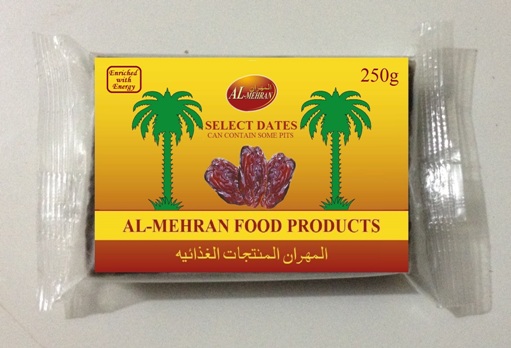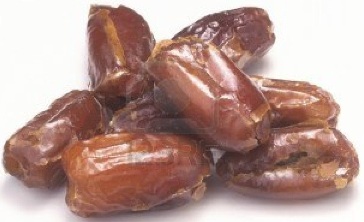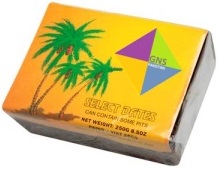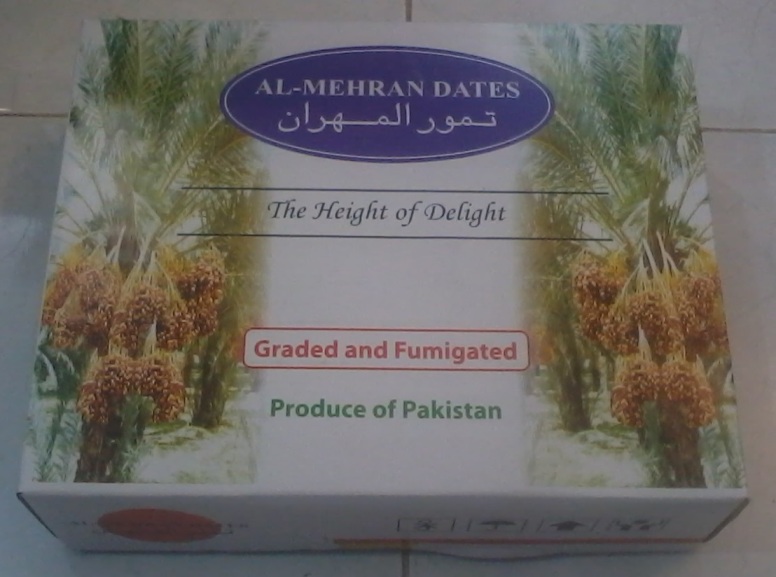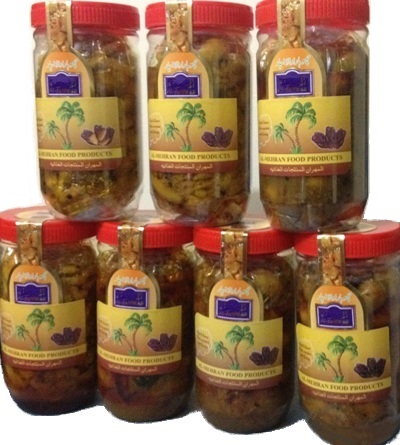Selective Useful News & Articles on Dates production of Pakistan
Pakistan becomes third largest exporter of dates
ISLAMABAD - Pakistan has become the third largest country in the world that is exporting dates to the rest of the world and with proper attention and appropriate interventions this sector can flourish manifold.
The date sector offers substantial opportunities for exports, income and employment generation in addition to economic growth of the country, said an official of Ministry of Commerce and Textile while talking to APP here.
The annual production of dates in Pakistan is estimated at around 535,000 tonnes of which only 86,000 tonnes are exported and the rest are either consumed locally or perish, he informed. Chief Executive Officer Harvest Trading Ahmad Jawad told that Pakistani dates exports could be raised to $200 million from the current $28 million with proper processing and packaging. Since 1999, per acre yield of dates in Pakistan has not increased much,whereas worldwide production increased by 166 per cent, he added. Highlighting the problems, the CEO said that the country lacked storage facilities and so exported some quantity of dates while the rest perish. Thus due to these problems the country had to import dates during the month of Ramadan.
Importers of dates such as Germany, Denmark, India, Nepal, USA, UK, Afghanistan and Canada are re-exporting Pakistani dates after quality enhancement and preparation of by-products, at a price that is four to six times higher than their import price," said Jawad.
"Of the 300 varieties of dates produced in Pakistan, Begam Jangi of Balochistan, Aseel of Sindh and Dhakki of Dera Ismail Khan are the varieties which are sought after the world over due to their exotic taste," said Jawad. He further said that dates could fetch many more millions of dollars if focus was given to value addition such as the use of dates in preparing date sweets, jams, chocolates and other products.
Even the damaged crop is used for medical purposes and date oil is fit for use in cosmetics. He maintained that the usage of dates increases during the winter season thus its price and demand surges.
Another report by the USAID revealed that lack of awareness about best farming practices, improper fruit handling techniques, and an absence of developed processing facilities are major constraints inhibiting profitable date production in Pakistan.
Farid, a date farm owner stated that usually the harvest season of dates starts in July in upper Sindh, during the monsoon season, they remain safe due to lack of rain in these areas during harvesting.
Source: THE NATION
Pakistan becomes third largest exporter of dates
Sunday, 19 January 2014 19:27
Posted by Imaduddin
ISLAMABAD: Pakistan has become the third largest country in the world that is exporting dates to other countries and with proper attention and appropriate interventions this sector can flourish manifold.
The date sector offers substantial opportunities for exports, income and employment generation in addition to economic growth of the country, said an official of Ministry of Commerce and Textile while talking to APP here.
The annual production of dates in Pakistan is estimated at around 535,000 tonnes of which only 86,000 tonnes are exported and the rest are either consumed locally or perish, he added.
Chief Executive Officer Harvest Trading Ahmad Jawad told that Pakistani dates exports could be raised to $200 million from the current $28 million with proper processing and packaging. Since 1999, per acre yield of dates in Pakistan has not increased much, whereas worldwide production increased by 166 percent, he added.
Highlighting the problems, the CEO said that the country lacked storage facilities and so exported some quantity of dates while the rest perish. Thus due to these problems the country had to import dates during the month of Ramadan.
Importers of dates such as Germany, Denmark, India, Nepal, USA, UK, Afghanistan and Canada are re-exporting Pakistani dates after quality enhancement and preparation of by-products, at a price that is four to six times higher than their import price," said Jawad. "Of the 300 varieties of dates produced in Pakistan, Begam Jangi of Balochistan, Aseel of Sindh and Dhakki of Dera Ismail Khan are the varieties which are sought after the world over due to their exotic taste," said Jawad.
He further said that dates could fetch many more millions of dollars if focus was given to value addition such as the use of dates in preparing date sweets, jams, chocolates and other products. Even the damaged crop is used for medical purposes and date oil is fit for use in cosmetics.
He said that the usage of dates increases during the winter season thus its price and demand surges.
Another report by the USAID revealed that lack of awareness about best farming practices, improper fruit handling techniques, and an absence of developed processing facilities are major constraints inhibiting profitable date production in Pakistan. Ghulam Farid, a date farm owner stated that usually the harvest season of dates starts in July in upper Sindh, during the monsoon season, they remain safe due to lack of rain in these areas during harvesting.
Copyright APP (Associated Press of Pakistan), 2014
Source: BUSINESS RECORDER
Prospects of date export - News
Mohammed Arifeen
Pakistan is the seventh top producer of dates with some 3 per cent share in world production. Pakistan at one time was the fourth top producer and exporter of dates. Pakistan requires consistent efforts to improve its quality production and boost exports. A good number of countries like USA, Canada, Algeria, Israel, Tunisia, and Oman have devised and applied reasonable standards for both their locally produced and imported dates; regrettably Pakistan is lacking such kind of system and standard research.
Pakistani dates' export consists of two varieties, fresh dates and dried dates. Dried dates are in high demand abroad. Major buyers of date include Canada, USA, Germany, UK, Denmark, India, Bangladesh, Nepal, Sri Lanka, South Africa, Japan, China, South and North Koreas. During the year 2006-07, Pakistan earned $38.327 million from export of dates. In this year Pakistan exported about 97,323 tonnes of dried dates and 6,767 tonnes of fresh dates. Pakistan consumes most of the dates locally and only about 100,000 to 150,000 tonne is exported annually.
In Pakistan, main dates growing areas are Khairpur, Punjgoor, Dera Ghazi Khan, Bahawalpur, Multan, Nawab Shah, Kotri, Bannu and Rohri. Total production of dates in the year 2006-07 were 426,281 tonne of which Sindh's share was 47.2 per cent followed by Balochistan 40.4 per cent, Punjab 10.1 per cent and NWFP only 0.3 per cent.
There are over 300 varieties of dates produced in Pakistan. Trading wise the major date varieties found in Pakistan include Aseel, Fasli, Karbala and Kupro of Sindh; Muzwali, Begum Tangi, Jaan Swore, Kehraba and Rahai of Balochistan; Dhakki and Gulshan of NWFP and a seedless variety of Punjab.
The date varieties grown in Khairpur and Panjgoor are the most admired ones. Presently, more than 54 date processing units are working in the country. The major processors are Panama Impex Agency, Karachi, Pak- Iran International (Pvt) Ltd, Syed International Sukkur, Prime Dates Product (Pvt) Ltd ,etc. Other processing units are established at Lahore, D I Khan, Quetta, and Turbat. The tension between Pakistan and India after Mumbai blast has affected export of dried dates from Pakistan to India. The date markets of Khairpur and Sukkur export ninety per cent of dried dates to India. The Sindh province earns millions of foreign exchange through export of dried dates to India.
Date palms have separate male and female plants. They can grow in warm climate and in arid lands, where they can adapt to heat and can tolerate soil in which other trees might not survive. Date palms after planting take 4 to 7 years to produce fruit and for a good yield for commercial harvest between 7 to 10 years. Fully developed date palm can produce 80 to 120 kilograms of dates per harvest season. In order to get into market for profitable business the bunches of dates be thinned and covered before ripening so that they grow in bigger size and are safe from severe weather conditions and pest attacks. Dates ripen in four stages namely unripe, full-size crunchy, ripe-soft and ripe-sun-dried. Due to hot and dry climate the date palm is free from serious diseases compared to other fruit trees. Even then it is susceptible to known disease called Bayoud disease which is caused by fungus, fusarium, oxysporum, etc. Some pest disease and other disease can affect the palm growth and yield even though it may not destroy the tree completely. In this situation the cleaning and pruning are considered as the best way to hinder the spread and infection of various pests and animals.
Pakistan though being one of the leading producers of dry dates but its date industry is still in infancy. It is unable to process a reasonable production of especially dried date for export for which there is a huge demand here and abroad. It has the potential to become the largest source of foreign exchange earner in the world from dried date. A number of countries have set date standards for domestically produced and imported dates. Pakistan for boosting date export must strictly follow the same measures. The chances for value addition are very bright if Pakistan introduces new modern technique in management practices and improve a lot in date packing, packaging, storing, marketing and advertising. Gwadar deep sea- port and the coastal highway are likely to open much needed outlet for export of dried dates more particularly.
Source: THE FINANCIAL DAILY
Comparative analysis of date palm culture in India and Pakistan
Pakistan and India hold a significant position in international Dates market, former as a second largest exporter and later being the largest importer of dates. However, trade between India and Pakistan has been fundamentally influenced by factors that are not purely economic such as war, political relations etc. Pakistan exports 80,700 tons of Dates to India during the year 2007. On the other hand, India is the largest importer with global market share of about 38%. To decrease the dependence on other countries, India is trying to increase area and production of date palm in some of its regions. As a major exporter of Dates to India, this is of particular interest for Pakistan. Therefore an analysis of development efforts in date palm industry by India is important for Pakistan in order to plan for the future Dates trade with India and other countries.
In India, climate of Gujarat, Rajasthan and some areas of Punjab is suitable for the production of date palm. However, the commercial cultivation of date palm occurs mainly in the western border of India and the coastal belt of Kutch district of Gujarat contributes about ninety percent to the total date production in India. More than 1.5 million date palm trees are present in Kutch, spread widely from Anjar to Mandvi including Mundra and other areas. This seed propagated population represents a huge biodiversity of date palm with fruits of varying qualities. Government initiatives to promote date palm culture especially in Gujarat and Rajasthan states leads to significant increase in area and production of date palm during the last 15 years. In Kutch, for example, the area under cultivation increases from 8,973 ha to 16,000 ha during last ten years. Date Palm Research Centres at Mundra in Kutch, Bikaner and Jodhpur in Rajasthan, Hissar in Haryana and Abohar in Punjab are working for the promotion of date palm in their respective regions. Government of India implements Integrated Development of Date Palm with an outlay of Rs. 50.00 million during the year 2001 and provides 25% assistance for 100 hectares for date palm growers of Gujarat under National Horticulture Mission plan in 2005-06. At Jaisalmer and Bikaner Districts, a model farm of date palm in 130 hactres has been developed. The Anand Agriculture University (AAU) in Gujarat has standardized date palm micro-propagation on commercial scale. Moreover, a tissue culture laboratory is also developed at Jodhpur, Rajasthan. The tissue culture Date varieties are Barhee, Khunezi, Medjool, Hallawi, Khadrawy, Zahidi and Deglet Noor. A present research in India shows that only Barhee and Hallawi varieties seems to be successful in Rajasthan conditions with an annual yield of about 66 kg and 60 kg per palm respectively. Total estimated production of dates in India from the year 1996 to 2012 were 96.44, 94.0, 94.05, 94.05, 93.15, 93.7, 92.25, 94.00, 98.00, 99.00, 99.60, 99.723, 99.88, 113.30, 113,30, 113.30, 156.66, 120.00 thousand tons in area of 75.530, 75.131, 75.530, 76.930, 78.633, 78.521, 77.910, 74.810, 81.700, 82.000, 84.800, 90.100, 90.717, 90.639, 90.100, 90.100, 90.634 thousand hectares respectively. Despite the efforts made by Indian Government, there is still vast area to be focused for the promotion of date palm especially provision of "elite" varieties to growers either through tissue culture or through screening of local cultivars.
Pakistan is among the top five producers of Dates in the world and produces more than 600,000 metric tons of Dates. Pakistan exported 88,451 tones of dried dates and 4,687 tones of fresh dates and earned $36.03 million during the year 2007-08. Panjgur and Turbat in Balochistan, Khairpur and Sukhur in Sindh, Dera Ismail Khan in Khyber Pakhtunkhwa and Muzafargarh, Dera Ghazi Khan and Jhang in Punjab are leading districts in terms of date palm production. All provinces except Punjab have their own prominent exportable Date varieties. Pakistan has a huge share of 18% in world Date market. India, Bangladesh, USA, Canada, Germany, UK, Denmark and Australia are some important export market for Dates. However, Pakistan receives low prices of its Dates as compared to other export countries like Israel, France and Tunisia because of substandard and lack of value addition.
In addition to trade perspective, the most important is the context of date palm growers especially the small farmers of both countries. At present the growers of Sindh and Dera Ismail Khan in Pakistan receive an amount of about Rs. 23.00 and Rs. 28.57 per kg as against retail price of about 200 Rs per kg for fresh dates while growers in India fetched an amount of about Rs. 10 per kg from the year 1999 to 2002 and Rs. 20.00 in 2011-12. At harvest season, growers of Pakistan usually use the traditional method of sun drying of dates by placing dates on straw mats in open grounds. This causes contamination and defective texture of the fruit which reduce its trade value.
Pakistan has the potential to provide good quality Dates to India and other countries with different shapes and forms and can compete with other exporting countries. Dried Dates constitute the major volume of Pakistani export. However, export statistics shows that soft Dates fetch higher prices in international market which depicts that there is an opportunity for Pakistan to increase share in global trade of soft Dates. Organic Dates can also be grown easily in Pakistan by following the organic standards. There is a need to focus on post-harvest management and advanced processing in order to produce international standard Dates and Dates by-products.
Source: DAILY TIMES
Proper packaging may boost dates exports manifold: TDAP
Pakistan remains unable to get maximum advantage from its dates' exports to India, lacking in proper marketing mechanism. 'Presently export has increased by only 24 percent. Pakistan is one of the main growers of dates but due to absence of marketing mechanism, a huge quantity of dried dates is exported to India at throwaway prices, said a Trade Development Authority of Pakistan (TDAP) official while talking to Business Recorder here on Monday.
"If government steps up to introduce a proper packaging method for both fresh and dried dates, the current volume of date exports could surge manifold," he added According to statistical data compiled by TDAP shows that India has become the largest country which imported some 144586.354 tons of dry dates from Pakistan during July-June (2012-2013) against the import of 116381.758 tons during previous year.
In the same way India has imported some 1495.74 tons of fresh dates from Pakistan during July-June (2012-2013) against the imports of 13.87 tons last year. India imported some 143090.61 tons in 2013 against 116367.888 during the same period of preceding financial year.
Pakistan's total date exports were witnessed as 156123.393 tons in 2012-2013 while the exports volume during FY 2011- 0212 was recorded as 147372.27 tons. The country earned some $76.081 million from total date exports during FY 12-13 out of which some $7.271million were fetched from fresh dates exports while $68.810million form dried dates during the said time period.
The other major importing countries of fresh dates from Pakistan UK that imported fresh dates worth of some 2274593 Kilo grams, UAE imported some 967074 kg, US, 2179718 kg, Afghanistan some 300860kg and Saudi Arabia imported some 289150 kg of fresh dates from Pakistan in 2013.
In the same way Nepal was the 2nd largest country after India that has imported dried dates around 996880 kilo gram from Pakistan during FY-2013, Bangladesh was 3rd importing some 931400 kg, similarly Germany imported 326000kg of dried dates, UK 140250kg and UAE imported dried dates some 211198 kilo gram from Pakistan during the same period of FY-2013.
"Dates are cultivated in almost all 4 provinces", said another TDAP official. He said Khairpur region produces some 40 percent of total date production of the country, adding that "Therhi" in district Khairpur occupies a central place in date processing in Pakistan. Some dozen of factories are established around this township. He said there are some varieties of dates, as "Aseel, Karbalai, Fasli, Muzawati, Sabzo, Jaan Hillawi, Begum Jangi, Dashtiari, Swore, Kehraba, Dhakki, and Rabai which are commercially important saying that Pakistan can extract a huge foreign exchange through the export of the said varieties. If government steps up to introduce a proper packaging mechanism, the current volume of date exports could surge to manifold, he claimed.
Source: BUSINESS RECORDER
New avenues: Pakistan looking for quality dates
"The annual production of dates in Pakistan is estimated to be around 535,000 tons of which only 86,000 are exported and the rest are consumed locally," says an official. PHOTO:AFP/FILE
ISLAMABAD: Pakistan has become the third largest exporter of dates in the world with the Ministry of Commerce and Textile now looking for ways to enhance the sector with proper attention and appropriate interventions.
"The date sector offers ample opportunities for exports, income and employment generation in addition to economic growth of the country," said an official of the Ministry of Commerce and Textile.
"The annual production of dates in Pakistan is estimated to be around 535,000 tons of which only 86,000 are exported and the rest are consumed locally," he informed.
Harvest Trading Chief Executive Officer Ahmad Jawad added that the Pakistani date exports could be raised to $200 million from the current $28 million with proper processing and packaging.
"Since 1999, per acre yield of dates in Pakistan has not increased, whereas worldwide production increased by 166%.
"Importers of dates such as Germany, Denmark, India, Nepal, USA, UK, Afghanistan and Canada are re-exporting Pakistani dates after quality enhancement and preparation of by-products, at a price that is four to six times higher than their import price.
"Of the 300 varieties of dates produced in Pakistan, Begam Jangi of Balochistan, Aseel of Sindh and Dhakki of Dera Ismail Khan are the varieties which most popular due to their exotic taste."
Jawad further said that dates could increase the trade balance if focus was given to value addition such as the use of dates in preparing date sweets, jams, chocolates and other products.
Published in The Express Tribune, January 18th, 2014.
Like Business on Facebook, follow @TribuneBiz on Twitter to stay informed and join in the conversation.
Source: TRIBUNE
Export of dates: bright prospects
By Alauddin Masood
Pakistan will be exporting 800 tonnes of dates, worth $650,000, to Denmark every year as a result of a collaboration with one of Denmark's leading fruit snack producing companies, Castus.
The nutritional product - dates from southern Pakistan - is immensely popular among Danish children and it has opened up new business opportunities for Pakistani companies to enter the Danish market, which is bound to increase economic cooperation between both the nations.
Pakistan is the fifth highest producer and exporter of dates. The top five countries producing dates - Egypt, Saudi Arabia, Iran, UAE and Pakistan - contribute over 60 per cent to the global production.
Though Pakistan happens to be one of the topmost producers of dates, it is still not able to process even one-third of its total annual production of 625,000 tonnes. That explains why the country could export a meager 11 per cent of the total dates produced. However, dates exports at that particular level fetched over $30 million annually in foreign exchange for the country.
These figures indicate there is a great scope for increasing the exports of Pakistani dates as they have the potential to become one of the leading sources of foreign exchange earnings.
The chances for value-addition in dates are very high. If the country opts for processing dates through modern techniques, pays vigilant attention to packaging and dates' product manufacturing, this versatile and highly nutritious fruit has the potential to become another top source for foreign exchange earnings for the nation aside from cotton.
Cultivation Dates are grown in over 40 countries of the world. With a production of 1.170 million metric tonnes, Egypt occupied the leading position amongst the top date producing countries.
The area and production of dates have enhanced significantly, in Pakistan, during the last 30 years. Date production in Pakistan surged from 148,000 metric tonnes in 1969-70 to 233,700 metric tonnes in 1982-83. It stood at 290,000 metric tonnes in 1995 and increased to 579,900 metric tonnes in 1999-2000, and stood at 625,000 metric tonnes in 2005, according to the Food and Agriculture Organisation (FAO).
The main areas where dates are produced in the country are: Khairpur Mirs, Therhi, Babarloi, Piryaloi, Garrhi Mori, Pir Jo Goth, Rohri and Pano Aqil in Sindh; Turbat and Panjgur in Balochistan; Bannu in Khyber Pakhtunkhwa, and southern districts of the Punjab.Producing dates is a labour intensive job, which generates considerable employment in the growing areas. To improve the quality of dates and also the yield of the fruit per tree, farmers engage labourers in the beginning of every calendar year to cut down unnecessary fronds and for de-thorning of the trees. Processing, packaging and sale of dates also provide meaningful employment to many people.
Pakistan made its entry in the world market of dates during 1982-83 for the first time when because of the Middle East situation it became difficult for some countries to obtain dates from Iran and Iraq. Earlier, Pakistan had been exporting only dried dates in limited quantities.
In 1982-83, Pakistan's exports of dates stood at Rs4.8 million. However, a decade later, in 1994-95, the country exported 45,700 tonnes of dates for $15,600. Since 1997-98, Pakistan is earning about $27-30 million from exporting dates.
Although Pakistan produces about 625,000 metric tonnes of dates annually, it happens to be the third largest importer of dates at the same time. On an average, the country is importing, for the last couple of years, dates worth $5 million annually.
Over 250 varieties of dates are cultivated in Pakistan over an area which was 76,900 hectares in 1999. Aseel, Shakri, Bhedir, Kharbala'en, Thothar, Fasli of Sindh; Begum Jungi, Shakri, Muzawati, Alini, Sabzo, Ape-Dandan, hussaini, Chapshuk, Kahraba of Balochistan; Dhakki, Azadi, Gulistan, Muscat, Shakri of Khyber Pakhtunkhwa; and Hillavi, Khudrawi, Shamran, Zahidi and Ziri of Punjab are some of the famous varieties. Of these, Aseel has won acclaim as an excellent variety in the international date market.
About two-thirds of the dates produced in Pakistan come from Balochistan. But, due to lack of infrastructure, dates worth one-quarter of a billion US dollars produced in that area never reach the market - domestic as well as international.
Exporting dates is likely to register a manifold increase in the coming years as a result of improvement in the infrastructure facilities, including date processing and packaging plants and also facilities for their storage. The Gawadar sea port and the coastal highway is likely to provide the much needed outlet for exporting dates, thus bringing prosperity to the date-growing areas of Balochistan in general and the coastal areas of that province in particular.
MAIN COUNTRIES PRODUCING DATES
Rank Commodity Production Production
(Int $1000) 'C' (MT) 'F'
1 Egypt 366,760 1,170,000
2 Saudi Arabia 282,292 900,540
3 Iran, Islamic Rep of 275,854 880,000
4 United Arab Emirates 238,23 760,000
5 Pakistan 195,919 625,000
6 Algeria 147,331 470,000
7 Sudan 103,445 330,000
8 Oman 74,606 238,000
9 Libyan Arab Jamahiriya 47,020 150,000
10 China 40,751 130,000
11 Tunisia 39,184 125,000
12 Morocco 21,755 69,400
13 Yemen 10,439 33,300
14 Mauritania 7,523 24,000
15 Chad 5,642 18,000
16 Qatar 5,329 17,000
17 United States of America 5,172 16,500
18 Kuwait 5,016 16,000
19 Bahrain 4,702 15,000
20 Israel 4,483 14,300
No symbol = official figure
F = FAO estimate
* = Unofficial figure
C = Calculated figure
Production in Int $1000 have been calculated based on 1999-2001 international prices
Source: THE NEWS
Production of Dates in Pakistan
Date Show 1999, organized by EPB, stresses for loan facilities to date growers
By AMANULLAH BASHAR
Sep 20 - 27, 1999
While the farmers generally look for timely rains to harvest a better crop, it is a reverse case with the date growers. Since the rain damages the date crop, the date growers always pray for dry weather.
During July and August, when the date palms are in full bloom, the date growers, due to lack of scientific and technological facilities, use spiritual methods as preventive measures to save crop from monsoon rains. "Taweez" hanging by date trees is a common feature in date growing areas in Sindh and Balochistan.
Monsoon rains damage entire date crop. The damaged fruit is harmful for human consumption. The annual production of dates in Pakistan is estimated at around 535,000 tonnes of which only 86,000 is exported, rest of them either consumed locally or perished.
Zulfiqar Ali Khan, one of the judges at the date show, told PAGE that Pakistan earns around $27 million per annum through date exports which does not reflect the real export potential of this sector. The lack of processing and packaging facilities matching to the international standards is another major reason for restricted exports. The processing or packaging facilities, whatever they are, exist in urban centres specially at Karachi. He suggested that since dates are perishable in nature, the processing facilities should be provided at farms to tap the full potential of the crop.
There are more than 300 varieties of dates produced in Pakistan. Out of these large number of varieties, Begam Jangi of Balochistan, Aseel of Sindh and Dhakki of Dera Ismail Khan are the varieties which are much sought after the world over due to their exotic taste. Due to lack of processing and packaging facilities these highly valuable varieties do not fetch their real worth in the export market.
He was of the view that the government should take steps to safeguard the interest of the poor growers by announcing support price of the commodity. He disclosed that generally the growers hardly get Rs 5-10 per kg of dates against the price of Rs30-40 per kg in the local market. The poverty ridden growers are forced to sell their crop at a throw away price in the absence of an organized marketing network in the date growing areas. Arrangements for field packing units can make big difference not only in promotion of exports but a fair return to the hard labour of the farmers.
Syed Ghous Ali Shah, Advisor to Prime Minister on Sindh Affairs, while speaking at the concluding session of a 3-day "Pakistan Dates Show 99", organized by the Export Promotion Bureau, asked EPB to set up a research centre in date growing areas of Sindh to help date growers to develop better varieties of date. There is a need for permanent research arrangement to develop new varieties as well as chemicals for protection of the date crop.
Ghous Ali Shah also suggested that technology for making syrup from the damaged crop should also be evolved in Pakistan, as it is being practised in other date producing countries. He also advised the
EPB to make loan arrangements for the date growers. Financially weak, the date growers generally accept in advance a lumpsum price of the crop from the middleman who offers a price of his choice.
Foreign buyers from Australia and Bangladesh visited the date show. Some non-resident Pakistanis from the US also placed orders.
Source: PAKISTAN ECONOMIST


